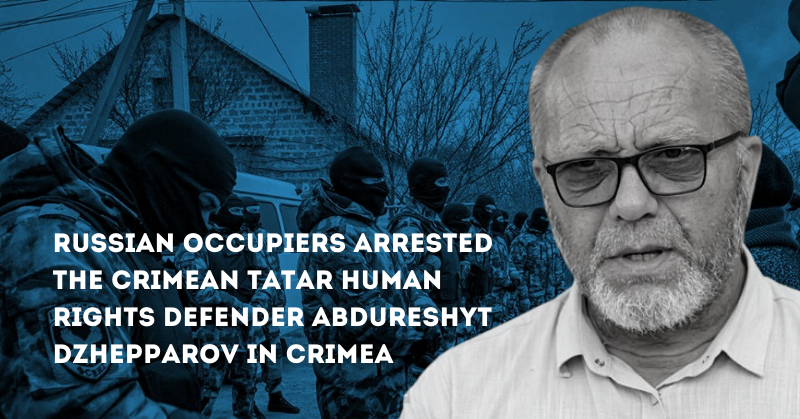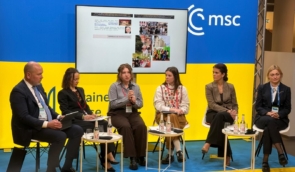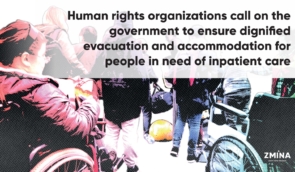Human rights defenders call on to release the veteran of Crimean Tatar national movement Abdureshyt Dzhepparov
On March 16, Russian security forces arrested Abdureshyt Dzhepparov, a well-known human rights activist and veteran of the Crimean Tatar movement. Security forces conducted a search and seized the activist’s equipment, while Dzhepparov himself was taken to the occupying administration’s police station in Bilogirsk (Autonomous Republic of Crimea temporarily occupied by Russia). Russian security forces also fired warning shots, threatening to fire automatic rifles at the crowd that gathered near the home of the Crimean Tatar movement veteran. Moreover, the occupiers detained Dzepparov’s nephews who came to visit their uncle – Mukhamed-Ali Dzhepparov and Fevzi Yakubov.

Abdureshyt Dzhepparov has dedicated his life to defending the rights of the Crimean Tatar people. He fought for their return to their homeland after their deportation by Stalin in 1944. Since the beginning of Crimea’s occupation by Russia, Abdureshyt has been actively helping victims of political persecution. In late 2014, he became coordinator of the Crimean Contact Group for Human Rights, which was created to search for victims of enforced disappearances on the occupied peninsula.
Abdureshyt Dzhepparov’s human rights work is recognized at the national and international levels. In 2020, the activist was nominated for the Nobel Peace Prize. In 2021, the President of Ukraine awarded Abdureshyt Dzhepparov the Order of Merit of 3rd degree.
For his human rights work, Abdureshyt Dzhepparov and his family are going through trials and persecution that those living in the civilized world would find hard to imagine. In September 2014, unknown individuals in black uniforms abducted his son Islyam Dzhepparov and nephew Dzhevdet Islyamov, whose fate and whereabouts are still unknown. There is every reason to believe that the abductions of Abdureshyt Dzhepparov’s family members were organized by the FSB. Dzhepparov was repeatedly detained while crossing the administrative border between the Autonomous Republic of Crimea and Kherson Oblast (see details here and here). Recently, occupying law enforcement authorities have repeatedly warned Abdureshyt Dzhepparov regarding the “inadmissibility of breaking the law” (see details here and here).
It is currently known that the investigation against Abdureshyt Dzhepparov is led by Ruslan Shambazov, head of the E Center (Russia’s Anti-Extremism Center), who was involved in the politically motivated administrative arrests of lawyer Edem Semedlyaev and Crimean Tatar Kurultay delegate Edem Dudakov. As of writing this statement, there is no reliable information regarding the charges brought against Abdureshyt Dzhepparov, or the whereabouts of Muhamed-Ali Dzhepparov and Fevzi Yakubov.
The Ukrainian human rights community views the detention of Abdureshyt Dzhepparov as part of a systematic and widespread practice of persecution of Crimean human rights defenders, activists and leaders of the Crimean Tatar people by the Russian occupying authorities, which can be considered crimes against humanity under Art. 7(1)(h) of the Rome Statute of the ICC. Currently, about 80% of all Crimean political prisoners are Crimean Tatars. About 75% of all arbitrary searches in Crimea are done in the homes of Crimean Tatars. Crimean Tatars also make up the majority of victims of enforced disappearances, whose fate and whereabouts are still unknown.
Such scale of persecution in Crimea has been made possible, among other things, due to the inadequate response of the international community to the occupation of the Crimean peninsula and subsequent war crimes, crimes against humanity and gross human rights abuses faced by Ukrainian citizens in the occupied territories. The full-scale Russian invasion of Ukraine and the suffering of the civilian population that began on February 24, 2022 could also have been prevented, had the international community taken a strong and steadfast stance regarding the events in Crimea and Donbas.
In this regard, Ukrainian human rights organizations call on the governments of foreign countries, member states of the Crimean Platform, international organizations, national and international non-governmental organizations, expert communities and other activists to:
- Strongly condemn the detention of human rights activist and veteran of the Crimean Tatar movement Abdureshyt Dzhepparov, as well as of Muhamed-Ali Dzhepparov and Fevzi Yakubov;
- Put political, diplomatic and economic pressure on Russia as the occupying power on the Crimean peninsula to secure the immediate and unconditional release of Abdureshyt Dzhepparov, Mohamed-Ali Dzhepparov and Fevzi Yakubov, as well as all Crimean political prisoners;
- Introduce individual sanctions against judges, FSB investigators, E Center officials, officials of penitentiaries and other persons directly involved in gross human rights violations, including E Center official Ruslan Shambazov;
- Carry out constant monitoring of the human rights situation in the Autonomous Republic of Crimea, Sevastopol, certain areas of Donetsk and Luhansk oblasts and all other territories temporarily occupied by Russian troops;
- Constantly keep the issue of Crimea and the human rights situation on the peninsula on the international agenda;
- Not allow any easing of sanctions against Russia until complete deoccupation of Ukraine within its internationally recognized borders, including the Autonomous Republic of Crimea and the city of Sevastopol.
Signatories
Diya Human Rights Center
Center for Civil Liberties
CrimeaSOS
Crimean Human Rights Group
Ukrainian Helsinki Human Rights Union
Centre of Civil Education “Almenda”
Regional Centre for Human Rights
Media Initiative for Human Rights
Kharkiv Human Rights Protection Group
If you have found a spelling error, please, notify us by selecting that text and pressing Ctrl+Enter.















